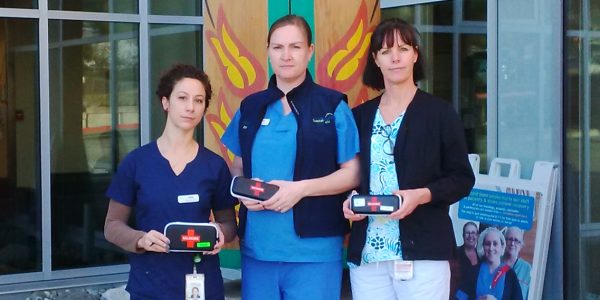Overdose policy updates
A number of policy and guidance documents have been updated to support the public health overdose crisis. Please review this info as it may be relevant to your job.
- Anyone can administer naloxone
VCH supports all staff who encounter a suspected opioid overdose in community settings including within a community health centre or on the grounds of a health facility to administer naloxone and first aid. Amendments to the Health Professions General Regulation under the Health Professions Act enable any person in a community setting to administer naloxone and first aid to another person if they suspect that person is suffering from an opioid overdose.
MD, NP, RN, and RPN should follow this VCH clinical practice document.
LPN, PT, OT, SW, RT, unregulated care providers (such as harm reduction workers and peer workers) should follow this clinical practice document.
All VCH teams with staff who might encounter an overdose while on outreach or are asked to leave a fixed site to intervene must adapt and implement these policies for their specific setting:
http://vch-connect/policies_manuals/reg_policy_clinical/SOP/Documents/SOP.0002.pdf
http://vch-connect/policies_manuals/reg_policy_clinical/SOP/Documents/SOP.0003.pdf
- Discovery and disposal of suspected illicit substances
If staff encounter a suspected illicit substance in the course of their work, they should ask the patient or their family to remove the substance from the facility. If they are not able to comply, staff should contact Integrated Protection Services who will work with police to dispose of the substance according to their Standard of Practice. At sites without security, staff may contact police and ask for a “no hold seizure”. No patient information should be released to police without a production order or warrant.
Staff should wear gloves when handling the substance, receive the substance in a plastic bag, leaving it in its original packaging, and store it in a secure location until police collect the substance. If police decline to collect the substance, it may be disposed by being flushed down a toilet or sink.
In most cases patients or families will remove the substances. When the substance can’t be removed, police will seize the substance if they believe it represents a significant amount of an illicit substance. Flushing will only be necessary when the substance can’t be removed by the patient or family and the police deem it to be an insignificant amount or unlikely to be an illicit substance. It is not expected that this procedure will have a significant impact on the environment because of the quantity and composition of substances disposed in this manner.
- Harm reduction practice
Harm reduction is a key pillar in the response to the overdose emergency. VCH has implemented a Harm Reduction Practice policy to help ensure that staff understand the principles of harm reduction and are able to integrate them into their work. For more info on the policy and its short online course check out this VCH News story.


Concerned
“If police decline to collect the substance, it may be disposed by being flushed down a toilet or sink.”
I have a bit of an issue with sending “illicit substances” into the sewage system hence future water supply! I thought that was the reason peope are told to take old/unused medications to the pharmacy is for correct disposal.Surely this reasoning would include opioid or unknown drugs.
Tiffany Akins
Good question, Jillian. In most cases patients or families will remove the substances. When the substance can’t be removed, police will seize the substance if they believe it represents a significant amount of an illicit substance. Flushing will only be necessary when the substance can’t be removed by the patient or family and the police deem it to be an insignificant amount or unlikely to be an illicit substance.
Judith
That doesn’t make flushing any better. I take great issue with this advice, especially coming from a “health” authority. Some of us are on septic systems, and who knows what that might do the the microbes that make such a system function properly. It can be detrimental for the environment, both flora and fauna, obviously with greater impact cumulatively. Would not a more appropriate alternative be to take the substance to a pharmacy where they are trained to, and have the “systems” in place for proper disposal of pharmaceuticals?
Tiffany Akins
We are not aware of any of our VCH facilities being on septic, and Environmental Health Protection believes flushing substances wouldn’t harm the system. We looked into whether Pharmacy could do the disposal but they are not in a position to be dealing with substances that are unknown.